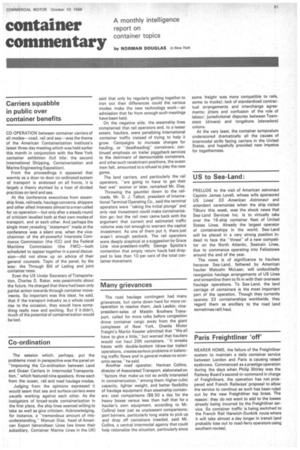Carriers squabble in public over container benefits
Page 53

If you've noticed an error in this article please click here to report it so we can fix it.
CO-OPERATION between container carriers of all modes—road, rail and sea—was the theme of the American Containerization Institute's latest three-day meeting which was held earlier this month in conjunction with the New York container exhibition (full title: the second International Shipping, Containerization and Marine Engineering Exposition).
From the proceedings it appeared that warmly as a door-to-door co-ordinated system of transport is endorsed on all fronts, it is largely a theory stymied by a host of divided practices on land and sea.
At the conference executives from steamship lines, railroads, haulage concerns, shippers and other allied interests almost to a man called for co-operation—but only after a steady round of criticism levelled both at their own modes of transport, and at each other, And perhaps the single most revealing "statement" made at the conference was a silent one, when the vicechairman of the all-powerful Interstate Commerce Commission (the ICC) and the Federal Maritime Commission (the FMC)—both scheduled to appear together in a panel discussion—did not show up on advice of their general counsels. Topic of the panel, by the way: the Through Bill of Lading and joint container rates.
Even the US Under Secretary of Transportation, Charles D. Baker, was pessimistic about the future. He charged that there had been only partial action towards through container movements. So important was this ideal, he said, that if the transport industry as a whole could rise to the occasion, they would have something really new and exciting. But if it didn't, much of the potential of containerization would be lost.
























































































































